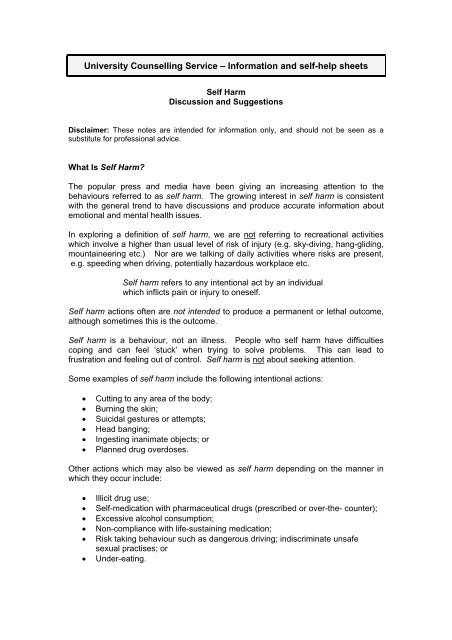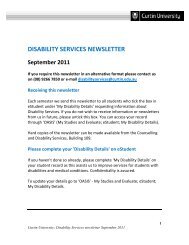University Counselling Service - Self Harm - Unilife
University Counselling Service - Self Harm - Unilife
University Counselling Service - Self Harm - Unilife
You also want an ePaper? Increase the reach of your titles
YUMPU automatically turns print PDFs into web optimized ePapers that Google loves.
<strong>University</strong> <strong>Counselling</strong> <strong>Service</strong> – Information and self-help sheets<br />
<strong>Self</strong> <strong>Harm</strong><br />
Discussion and Suggestions<br />
Disclaimer: These notes are intended for information only, and should not be seen as a<br />
substitute for professional advice.<br />
What Is <strong>Self</strong> <strong>Harm</strong>?<br />
The popular press and media have been giving an increasing attention to the<br />
behaviours referred to as self harm. The growing interest in self harm is consistent<br />
with the general trend to have discussions and produce accurate information about<br />
emotional and mental health issues.<br />
In exploring a definition of self harm, we are not referring to recreational activities<br />
which involve a higher than usual level of risk of injury (e.g. sky-diving, hang-gliding,<br />
mountaineering etc.) Nor are we talking of daily activities where risks are present,<br />
e.g. speeding when driving, potentially hazardous workplace etc.<br />
<strong>Self</strong> harm refers to any intentional act by an individual<br />
which inflicts pain or injury to oneself.<br />
<strong>Self</strong> harm actions often are not intended to produce a permanent or lethal outcome,<br />
although sometimes this is the outcome.<br />
<strong>Self</strong> harm is a behaviour, not an illness. People who self harm have difficulties<br />
coping and can feel ‘stuck’ when trying to solve problems. This can lead to<br />
frustration and feeling out of control. <strong>Self</strong> harm is not about seeking attention.<br />
Some examples of self harm include the following intentional actions:<br />
• Cutting to any area of the body;<br />
• Burning the skin;<br />
• Suicidal gestures or attempts;<br />
• Head banging;<br />
• Ingesting inanimate objects; or<br />
• Planned drug overdoses.<br />
Other actions which may also be viewed as self harm depending on the manner in<br />
which they occur include:<br />
• Illicit drug use;<br />
• <strong>Self</strong>-medication with pharmaceutical drugs (prescribed or over-the- counter);<br />
• Excessive alcohol consumption;<br />
• Non-compliance with life-sustaining medication;<br />
• Risk taking behaviour such as dangerous driving; indiscriminate unsafe<br />
sexual practises; or<br />
• Under-eating.
Why Do Some People Engage in <strong>Self</strong> <strong>Harm</strong> Actions?<br />
It is always important to consider the following questions when trying to understand<br />
why somebody self harms:<br />
• “What is happening in this person’s life that is so difficult that s/he<br />
chooses to deal with it by hurting him/herself?”<br />
• “What emotions is this person finding hard to manage?”<br />
• “What does this person get out of self harm?”<br />
In many respects it is easier to explain why most people do not practise self harm.<br />
Steven Levenkron, in his book “Cutting: Understanding & Overcoming <strong>Self</strong>-<br />
Mutilation” states that people who have a good level of confidence, sense of value<br />
and good self-esteem do not participate in self harm behaviours.<br />
Many people who initiate self harm actions do so at a time when they feel<br />
overwhelmed by their emotions. Some of the factors that have occurred in the lives<br />
of people who self-harm include:<br />
- Recent loss.<br />
- Conflict with peers and/or bullying at school.<br />
- Intimacy and self-esteem problems.<br />
- Previous abuse or assault that has not been resolved.<br />
- Having lived in a violent environment or been exposed to threats of<br />
harm and/or death – where the impact of this has not been resolved.<br />
- Emotional neglect in early life and/or ongoing personal denigration.<br />
- Being impulsive and difficulty coping with stress.<br />
- <strong>Self</strong> blame.<br />
- Alcohol and/or illicit drug use.<br />
Most people do not get a formal education about human emotional development.<br />
Thus, any understanding about the range of emotions that can occur in life is often<br />
left up to chance or the social setting in which one grows up. Some cultural groups<br />
actively discourage expression of difficult emotions and label open communication<br />
about emotion as ‘weak’. Fortunately, this situation is changing as understanding<br />
grows about the importance of feeling emotionally stable.<br />
Many factors contribute to feeling emotionally unwell or vulnerable inside. Just a few<br />
of these factors include:<br />
- Not having an understanding of one’s own reasons for self-harm.<br />
- Problems with recognising or naming difficult emotions, such as anger,<br />
anxiety or depression, when they occur.<br />
- Being afraid that nobody else will understand the self harm.<br />
- Being afraid that nobody will know how to deal with or treat the self harm.<br />
- Fear of being committed to hospital if this is disclosed to anybody.<br />
While some people do require hospitalisation when their behaviour is<br />
life-threatening, most people who self harm do not require either<br />
voluntary or involuntary hospitalisation.<br />
What To Do If <strong>Self</strong> <strong>Harm</strong> Is A Problem For You<br />
The first step is to have a thorough assessment with a fully trained and experienced<br />
mental health professional. This would most often be a Psychologist or a
Psychiatrist. This can be arranged through the <strong>University</strong> <strong>Counselling</strong> <strong>Service</strong><br />
(Building 109, Tel: 9266 7850) or your GP.<br />
The second step is to develop a treatment plan with your mental health professional.<br />
This plan may include (a) individual therapy and/or (b) group therapy and/or (c)<br />
medication.<br />
If you require after hours counselling or support you may telephone:<br />
• Crisis Care 9223 1111 or 1800 199 008 (Country Callers)<br />
• Psychiatric Emergency Team 1300 555 788<br />
• Lifeline 13 11 14<br />
• Salvo Care Line 9442 5777<br />
• Samaritans 9381 5555 or 1800 198 313 (Country Callers)<br />
• Rurallink 1800 552 002<br />
Tips For Coping With The Urge to <strong>Self</strong> <strong>Harm</strong><br />
• List the triggers to self harm and develop a safety plan.<br />
• Think of safe people and safe places to go when wanting to self harm.<br />
• Remove or avoid objects which may be used to self harm.<br />
• Develop awareness and recognition of feelings that may trigger self harm.<br />
• Think of alternative behaviours to self harm such as going for a run or<br />
telephoning a friend.<br />
• Try to be around other people when feeling vulnerable to self harm.<br />
• Learn good coping strategies – seeking help, thinking about how you dealt<br />
with similar situations in the past, problem solving strategies.<br />
• Take up regular, vigorous physical exercise and maintain a healthy diet and<br />
adequate sleep.<br />
• Participate in activities that you really enjoy.
















